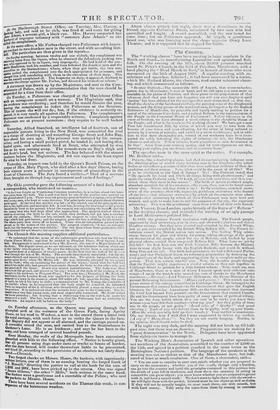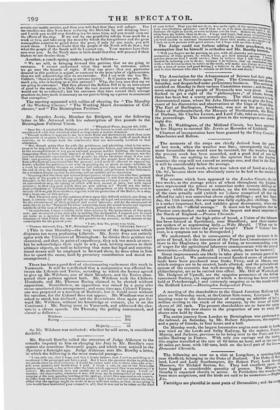Catintrn.
The working classes " have been meeting in large numbers in the North and South—in manufacturing Lancashire end agricultural Suf- folk. On the evening of the 1GO,, about 20,000 persons marched round St. Peter's Church, in the field of Petarloo, Manchester, with a band playing the " Dead March in Saul," in honour of those who were massacred on the 16th of August 1819. A regular meeting, with re- solutions and speeches, followed ; it had been summoned by a notice, which Mr. Richard Moore, the chairman, read amidst vehement cheer- ing, and which commenced as follows.
" Brother Radicals—The memorable 16th of August, that never-to-be-for- gotten day in Manchester, is near at hand, and we call upon you once more to assemble on the plains of I'eterlon, and there prove to the perpetrators of that inhuman deed that you have not forgotten nor will you ever forgive it until 'justice ' has been obtained for the outrages that were committed that slay. Shall the shrieks of the butchered children, the piercing elks of the slaughtered women, and the dying groans of the murdered men, be forgottm by the Radical Reformers of Manchester, for peaceably and legally meeting to petition for a repeal of the infamous Corn-laws, and a radical Reform in the representation of the People in the Commons' House of Parliament? Fellow labourers in the cause of freedom, we have obtained a mock reform in the should-be House of the People, and what is the result to the working classes? We have got a new Poor-law Amendment Bill, by virtue of which you may he torn from the bosoms of your wives and your offspring, for the crime of being reduced to poverty by a system of misrule, and exiled to a union workhouse ; and in addi- tion to that most abominable act, several of our workmen have been trans- ported for nobly defending the rights of industry—to wit, the Dorchester labourers and others. Fellow citizen., bestir yourselves as men determined to he free ! Arise from your seeming apathy, and let your oppressors see that, knowing your rights, you are deterloined to maintain them."
The speeches were in the same spirit as the notice. Fa example, Mr. Benbow said— Poverty, like a desolating plague, had shed its contaminating influence over the dwehing-place of almost every working man in the kingdom—the naked bodies or threadbare gumuteuts of that class were sullieient evidence of their de. gradation and their misery. Now, what could be the cause of all this? Was it to be attributed to the God of Nature ? No ! The Psalmist stated that He openeth his hand and filleth all things living with plenteousness ;" and again the sante Psalmist said,'' 0 Lord, all eyes look tutu thee, and thou ten- derest them their meat in due season." The fields of nature produced ample, abundant materials for all his creatures—the rouse, then, was to be found some- where else. Where did they think it lay ? In the merciless, unmixed aristo- cracy of the country—that vile, rapacious, perfidious aristocracy who framed all our laws—that infamous aristocracy by which all the concerns were admi- nistered—that aristocracy by which ail their Parliament men were bred and trained, and made to make laws to suit the purposes of the vile, the rapacious aristocracy. This was the pestilential au re from which all their evils flowed.
Mr. Vincent, from London, spoke bitterly of the fruits of " Reform " to the working classes; and reminded the meeting of an ugly passage in Lord Melbourne's political We— in 1830, the glorious French revolution took place. The French people, oppressed by their aristocracy., rose in ante', and obtained a glorious and almost bloodless victory. But they were cheated and swindled by the French Whigs, just as you were swindled by the British Whig Reform Bill. The French re- volution roused the British nation into action. The leading Whig aristo- cracy, hungry for place and thirsty for power, taking advantage of the gene- ral discontent of the people, raised the cry of Reform, and, backed by your physical efforts, carried their ten-puund Reform Bill. What have we got by this bill ? Its first fruit was the Irish Coercion Bill; because the Ministry were in sonic slight favour with the English Radicals, and could do without King Dan and his tail. The Irish had to ievanees, we had a Reformed Parlia- ment; and that Parliament begau its reforming propensities by destroying the civil privileges of the Irish, and supplanting them by a complete military des- potism. That was reform number one. Now, the London people thought that the English might experience a similar reform, so they met together in Calthorpe Street to petition for a little further reform. Now, mark me, men of :Manchester, there is a mart of whom I cannot speak with sufficient cone tempt—I mean the wretch who moved the vote of thanks to the Manchester murderers —( Groans)—Lord Viscount Melbourne, the Prime Minister of the present Reforming Government. (Hisses and groans.) This' wretch was the prime mover of the outrage committed in Calthorpe Street. He belonged to the Government that coerced Ireland—to the Government that gave the English labourers the Poor-late Amendment Bill—to the Government that increased the Civil List beyond Tory parallel—to the Government that coerced Canada. He and his Government have been guilty of every species of political villany. You are the Jury before which th^y are now to be tried ; you know their actions—you have felt their conduct—what say you ? Are they guilty of trea- son to the people, or not guilty? (Loud cries of " Guilty ! " and great cheering.) Each of you who believe them to be guilty, hold up your hands. (Here the whole assembly held up their (rands.) Your verdict is unanimous. Oh, my friends, how I wish that 1 were empowered to deliver my verdict. (A cry of Hang them ") No, they are not worth hanging. Besides, in my opinion, blood should never he shed.
The night was very dark, and the meeting did not break up till half- past nine, but there was no disorder. Preparations are making for a " great demonstration " in the North. Delegates have been appointed from eighty-six towns to manage it.
The Working Men's Association of Ipswich and other operatives not members of the Association, assembled to the number of 2,000 on the 15th, and agreed to a petition couched in the same terms as the Birmingham National petition. The language of the speakers at this meeting was not so violent as that of the Manchester men, but indi- cated at least as much resolution. Otte of them, a shoemaker, said- " You are now to consider in your own minds whether you are prepared to carry on the movement ; whether you of the :Ootith, though only a tractton, can go into the country and instil the principles contained in this petition into the minds of your fellow workmen, and show them the necessity of acting in concord for one great object ; you must know whether you are prepared to go out with it, and have a sacra week ! We don't want to fight theta with the sword— we will fight them with the pocket. Interest must be our object as well as theirs. If they will not be morally taught, we mule teach them, not with swords, but with hard money. Take away the taxes from them by ceasing to consume
certain exeseable articles, and then you will find that they will suinnir. The tee-totallers say they have been reducing the Malt-tax by not drinking beer ; and I wish you would stop drinkirg tea for some time, and you would soon see the effects of the step. If we can by any possibility refrain from work for a week or two, and take away the means by which the tax.gatherer and the great monopolists contrive to grind down the poor, if only for one week, you will crush them. I have no doubt that the people of the North will do that ; but what the people of the South will do I cannot say. Your masters have their eyes over you. In the North there is little doubt that they will proceed if their leaders do not deceive them."
Another, a coach.spring- maker, spoke as follows- " We are told, in bringing forward this petition, that we are going to
extremes. I cannot understand what they mean by extremes, unless we go over the bounds of right. If they can prove that any particular demand iu this petition is unjust, or contrary to the principles of righteousness, then we will acknowledge that we are extreme. But I say with the late Mr. Cobbett, there is no such thing as extreme justice.' It in justice we ask. But mark you, who is leading us to this extreme ? Why, the very men that say we are going to extremes! Had they allowed the Reform Bill to be an instrument of good to the nation, it is likely that the vast masses now collecting together would not be so collected ; but the extremes they have carried their corrupt practices to, have made it necessary on our part to bring up a power to counteract that corruption."
The meeting separated with vollies of cheering for " The Morality of the Working Classes," " The Working Man's Association of Col- chester," and " The Birmingham Petition."



























 Previous page
Previous page